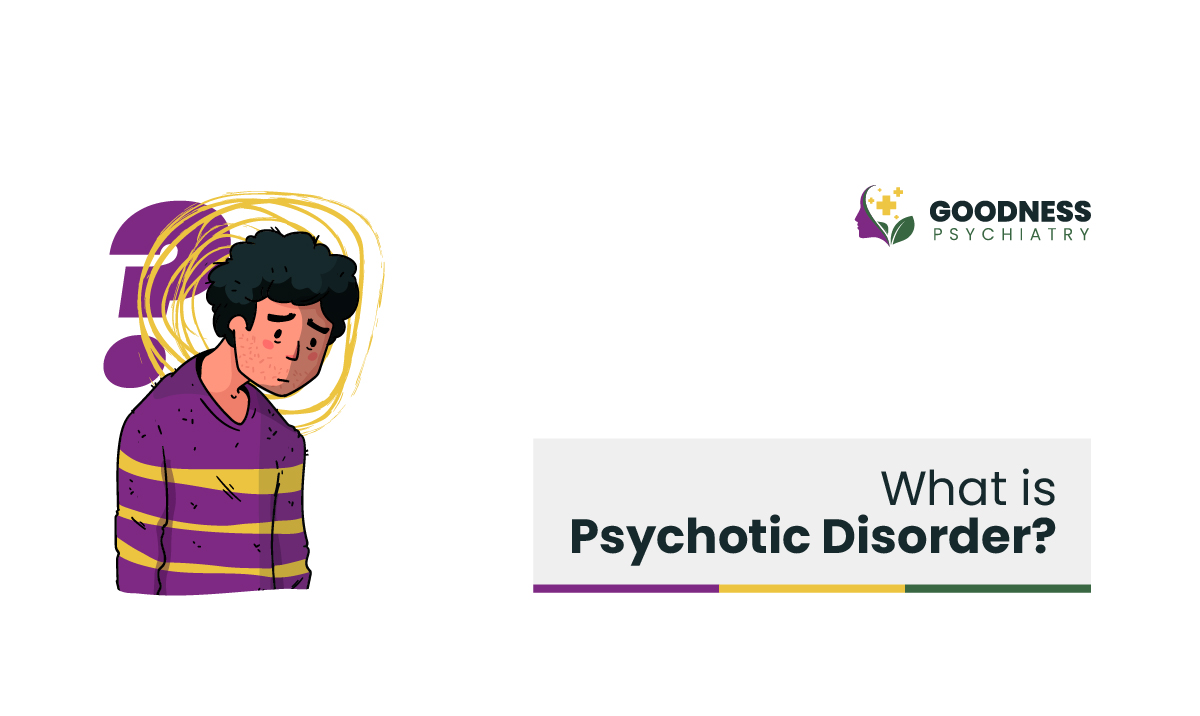Psychotic disorder is the withdrawal from reality. People may have wrong beliefs or experience things that aren’t real. It is when a person cannot differentiate between the hallucination and reality. So, it is the collection of symptoms that cause the person to become psychotic.
Furthermore, the withdrawal from reality affects both physical and mental health. It’s typically treatable with medication and other practices. If you or anyone you know is facing the issue of psychotic disorder, you may rely on Goodness Psychiatry. We are here to take you out of this situation.
Types of Psychotic Disorder
The main types of psychotic disorders include:
1. Schizophrenia
Schizophrenia is defined as the appearance of several symptoms of psychosis that lead to substantial functional damage. The symptoms of schizophrenia include:
- Hallucinations.
- Delusions.
- Disorganized speech and behavior.
2. Schizoaffective Disorder
People with schizoaffective disorder have signs of both mood disorders and schizophrenia.
3. Delusional Disorder
Delusional disorder mainly affects how a person thinks and perceives reality. Individuals with a delusional disorder are influenced to believe that their beliefs are fundamental despite all the controversy.
For example, they may have faith in:
- A celebrity is taking an interest in them.
- A group of people is chasing them.
- They have superpowers to control other people’s mind.
- They are being trailed or poisoned.
- Someone wants to harm them.
4. Brief Psychotic Disorder
Symptoms of the short-lived psychotic disorder are similar to schizophrenia. Nevertheless, they appear abruptly and are often caused by significant stressors, such as trauma or major changes in life. A psychotic episode continues for no more than a month. Later, people return to their normal condition.
5. Substance-induced Psychotic Disorder
Individuals with this disorder lose a trace of reality after using substances such as drugs, alcohol, or medication.
Additional Resources:
Warning Signs of Psychosis
Family and friends can assist and recognize the signs of schizophrenia and other psychotic disorders by observing the changing behavior. Early intervention may be beneficial to reduce the risk at a higher level and minimize the long-term effects. Moreover, every person faces different symptoms and signs.
Here are some common signs of psychosis:
- Change in sleeping patterns.
- Limit verbal interaction with others.
- Isolation from family and friends.
- Lack of emotional feelings.
- Decreased inspiration.
- Hallucinations.
- Suspiciousness or hostility.
For further information and support, you may contact us.
Symptoms of Psychosis
Individuals with a psychotic disorder may notice some signs from the family members:
- Loss of appetite.
- Unkempt appearance.
- Lack of motivation.
- Mood swings.
- Difficulty in paying attention for long periods.
- Loss of interest in usual activities.
- Getting angry for no reason.
- Confused thoughts.
- Unusual behavior.
- Self-isolating or taking up alcohol or drugs.
Treatment Options for Psychotic Disorders
Psychotic disorders are most efficiently treated with a combination of medications and therapies. A psychiatrist can help you regulate what’s best for you. It is based on the severity of your condition.
1. Medication
Antipsychotic medications are the basis of treatment. They help in controlling symptoms by influencing neurotransmitter systems in the brain — particularly dopamine. These medications can be divided into two main categories: first-generation antipsychotics (FGAs) and second-generation antipsychotics (SGAs). SGAs are also known as atypical antipsychotics, and they’re often preferred due to their lower risk of side effects.
2. Psychological Therapies
Cognitive-behavioral therapy (CBT) for psychosis is a commonly used psychological treatment. It focuses on dealing with thoughts and behaviors related to the psychotic symptoms. Additionally, family therapy can be a big help in providing support and education to the relatives of those affected, and social skills training can also be beneficial for improving social interactions and community functioning.
3. Social Support and Rehabilitation
Creating a supportive environment is key to recovery. This might involve community support programs that offer assistance with housing, employment, and daily activities. Rehabilitation programs focus on skill-building and employment support to facilitate a more independent life.
4. Early Intervention Services
For people experiencing their first episode of psychosis, early intervention services have been shown to be particularly effective. These programs provide comprehensive care, like:
- Medication.
- Psychological therapies.
- Support for education and employment.
Conclusion
Psychosis is a word usually used to describe numerous mental health situations. These symptoms can occur for an extensive range of reasons. It’s usually possible to treat these symptoms successfully. You may visit Goodness Psychiatry to get better care.
FAQs
What is an example of a psychotic illness?
If you experience psychosis and you have other signs too, then you may be given one of these diagnoses:
- Schizophrenia.
- Schizoaffective disorder.
What are the four significant symptoms of psychotic disorder?
Four significant signs of psychosis include:
- Confused thinking.
- Delusions
- False beliefs.
- Hallucinations .
What is the best treatment for psychosis?
Antipsychotic medicines are recommended as the first treatment for psychosis.
What are the three stages of psychosis?
The three stages of the psychosis include:
- Early.
- Acute.
- Recovery.


No comment